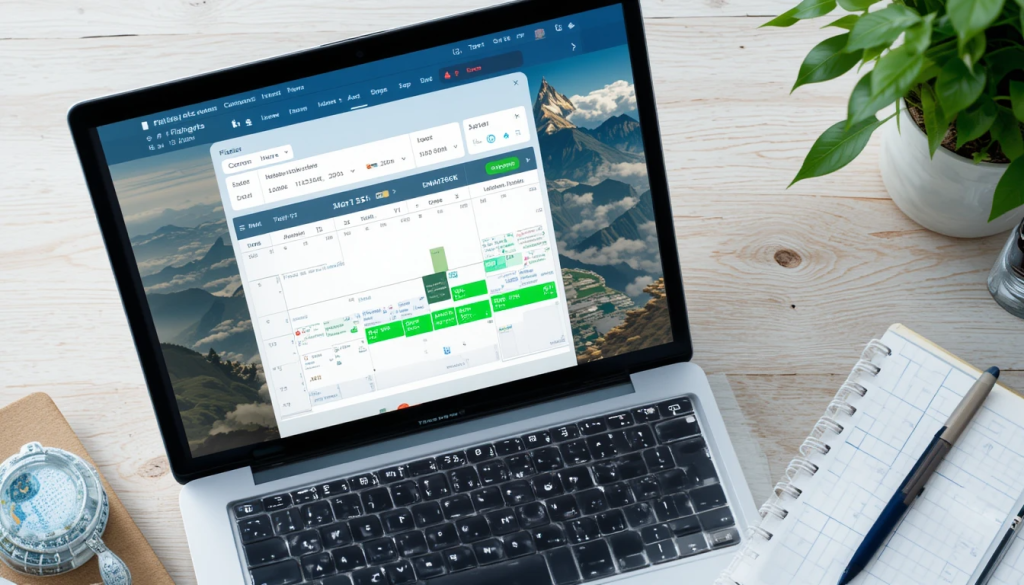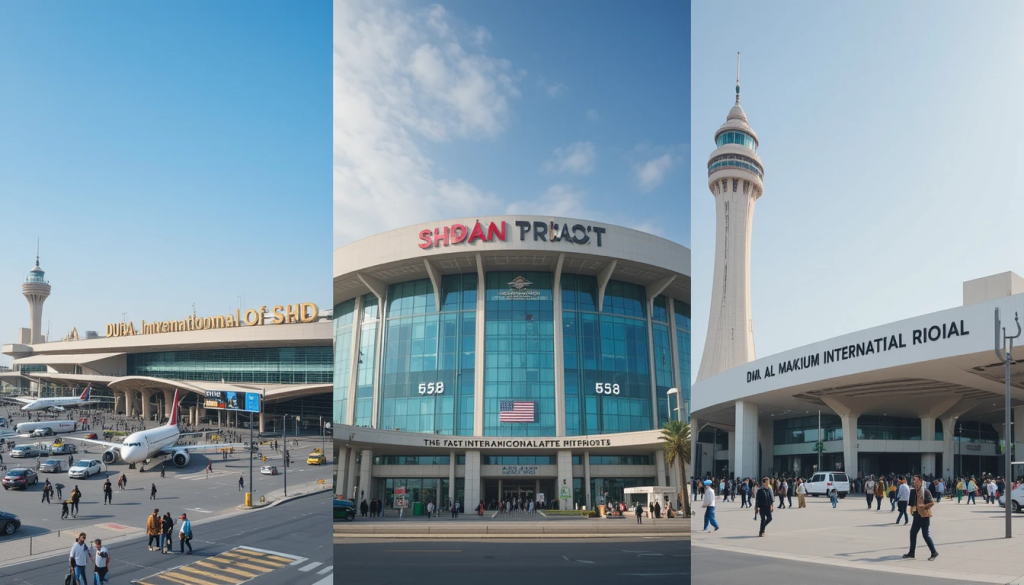Are you a UAE resident constantly battling the ever-fluctuating and often steep costs of airfare from bustling hubs like Dubai and Abu Dhabi? That dream of affordable travel, such as an affordable Umrah by bus, can quickly turn into a frustrating quest when faced with complex booking systems, unpredictable fare changes, and the nagging feeling you might be missing out on a better deal.
This guide is your definitive playbook for cracking the code of cheap flights from the UAE. We’ll cut through the noise, expose the booking traps that cost travelers thousands each year, and share proven, UAE-specific hacks for finding deals other passengers never even see.
By the end of this guide, you’ll have the tools, timing strategies, and insider know-how to consistently secure the lowest possible airfare whether you’re flying for business, family visits, long awaited adventures, or even exploring comprehensive Umrah packages. No more guesswork, no more overpaying just smart, budget-friendly travel that lets you explore more for less especially with a global visa guide from UAE.
Understanding Flight Pricing: What Influences Airfare from the UAE?
The Dynamic Nature of Airfare
Airfare isn’t a fixed number it’s a moving target shaped by complex airline revenue management systems. Airlines use dynamic pricing algorithms that continuously adjust ticket costs in real time. These systems monitor demand patterns, remaining seat inventory, and even your own search history to set prices that maximize revenue.
For example, if demand spikes for Dubai–London flights or Umrah by air from Dubai during winter holidays, the algorithm will detect increased searches and bookings, then raise prices accordingly
Similarly, a single seat might be sold at vastly different prices to two passengers sitting side by side simply because one booked earlier or secured a lower “fare bucket.”
Industry Insight: According to the International Air Transport Association (IATA), over 80% of global airlines now use advanced AI-driven revenue management tools, making airfare volatility a standard reality for travelers.
Key Factors Influencing Prices from the UAE
1. Demand & Seasonality
Peak travel periods such as Eid holidays, school breaks, and New Year’s consistently push fares higher from UAE hubs like Dubai International (DXB) and Abu Dhabi International (AUH). High-profile events such as Expo 2020 (and similar future global gatherings) also trigger fare surges as inbound and outbound demand rises, sometimes requiring a UAE visa from Pakistan or other countries.
2. Fuel Costs & Operational Expenses
Airline ticket prices are closely tied to global oil market trends. When crude oil prices climb, jet fuel costs increase a significant expense for carriers. For UAE-based airlines, operational costs such as airport fees, staffing, and fleet maintenance also factor into the final fare.
3. Competition
The UAE’s position as a major aviation hub means heavy competition among carriers from Emirates and Etihad to low-cost players like Air Arabia and flydubai. On competitive routes (e.g., Dubai–Mumbai or Abu Dhabi–Cairo), this rivalry often drives down prices. However, monopoly routes with fewer operators tend to remain expensive.
4. Route Popularity & Direct vs. Indirect Flights
Popular routes such as Dubai–London or Abu Dhabi–Sydney see high year-round demand, often keeping prices elevated. Direct flights usually cost more than connecting options due to time savings and convenience. Savvy travelers often save significantly by booking one-stop itineraries.
5. Booking Class & Fare Buckets
Even within economy class, airlines divide seats into multiple fare categories or “buckets” each with its own price point and rules. Lower-priced buckets sell out first, meaning the longer you wait, the more you’ll likely pay for the same seat.
Reference: UAE-specific fare analysis from OAG Aviation (2024) confirms that booking at least 6–8 weeks in advance can secure fares up to 30% lower for many regional and long-haul routes.

Top Strategies for Finding the Best Deals from the UAE
Finding cheap flights from Dubai, Abu Dhabi, or Sharjah isn’t just about luck it’s about knowing where and how to look. Below are proven strategies used by experienced UAE travelers to consistently secure the lowest fares.
1. Utilize Price Alerts
How It Works: Price alert tools on platforms like Google Flights, Skyscanner, and Kayak monitor fare changes in real time. Once you set your preferred route and date range, these tools notify you when prices drop.
How to Set Up:
- On Google Flights, search your route → click “Track Prices”.
- On Skyscanner, search your route → click “Get Price Alerts” and enter your email.
- Choose flexible date ranges (±3 days or “cheapest month” options) to maximize chances of catching low fares.
Expert Tip: Always set up alerts on multiple platforms for the same route. Each site pulls data from different sources, so you might see different price drops.
2. Browse in Incognito or Private Mode
Why It Matters: Some travel booking sites track your search history through cookies and may raise prices after repeated searches for the same route.
How to Do It:
- Chrome: Press
Ctrl + Shift + N(Windows) orCommand + Shift + N(Mac). - Firefox / Edge: Press
Ctrl + Shift + P(Windows) orCommand + Shift + P(Mac). - Safari: Go to File → New Private Window.
Expert Tip:
- Use incognito mode when checking fares multiple times.
- Clear cache & cookies regularly to prevent tracking.
3. Consider Layovers
Why It Works: Direct flights are faster but often cost significantly more than indirect ones. Booking a one-stop or two-stop flight can lead to savings of 20–40%.
Extra Bonus: If you have a long layover in cities like Istanbul, Doha, or Singapore, you can sometimes explore the city before catching your next flight effectively getting a mini-trip.
Expert Tip: Use multi-city search options on booking sites to compare direct vs. connecting flights and find the best price/time balance.
4. Leverage Credit Card Rewards & Airline Loyalty Programs
How It Works: Travel-specific credit cards and frequent flyer programs allow you to earn miles or points with every purchase. These can be redeemed for free or discounted flights, seat upgrades, or extra baggage allowances.
Best Practices for UAE Travelers:
- Cards like Emirates Skywards Mastercard or Etihad Guest Visa offer direct mile accrual.
- Combine miles from everyday spending with bonus offers from sign-up promotions.
- Redeem during off-peak seasons for maximum value.
Expert Tip: Even if you’re not a frequent flyer, consistent spending on the right credit card can earn enough points for one or two free regional trips per year.
5. Check Direct Airline Websites Before Booking
Why It Works: Aggregators like Skyscanner are great for comparisons, but airlines often run exclusive promotions on their own sites including coupon codes, limited-time offers, or free add-ons.
Expert Tip: Once you find a good deal on an aggregator, visit the airline’s website to see if it’s cheaper or includes perks like free seat selection or extra baggage.
Mini Case Studies – Real UAE Savings Stories
- Case 1 – Family Trip to Europe:
A Dubai-based family booked their Paris trip for AED 1,800 less by setting up Skyscanner alerts six months in advance and booking during an off-peak window in late January. - Case 2 – Solo Traveler to Asia:
A Sharjah resident saved 35% on a Bangkok ticket by flying with a 12-hour layover in Kuala Lumpur and using the opportunity to explore the city for a day. - Case 3 – Business Traveler Maximizing Rewards:
An Abu Dhabi consultant used her Emirates Skywards credit card for daily expenses, then redeemed miles to fly business class to Singapore for the cost of an economy ticket.

Smart Tools & Platforms for UAE Flight Searches
Choosing the right platform can make the difference between overpaying and locking in a bargain. Below is a comparison of the most effective tools for UAE-based travelers, highlighting their unique features, advantages, and drawbacks plus the type of traveler who’ll benefit most from each.
| Platform Name | Best For | Key Feature for UAE Flights | Pros | Cons | Ideal Traveler Profile |
| Skyscanner | Price comparison, flexible search | “Everywhere” search shows cheapest destinations from UAE, robust price alerts | Comprehensive search, user-friendly, cheapest month finder | May include budget airlines with strict baggage rules, redirects to third parties | Travelers with flexible dates and destinations |
| Google Flights | Price tracking, calendar & map search | Price graph for best dates, UAE-origin explore map | Fast, clean interface, price predictions, includes many airlines | Fewer budget airlines listed, fewer third-party booking options | Business travelers and planners who value speed and accuracy |
| Kayak | Meta-search with price forecasts | “Hacker Fares” combine one-way tickets on different airlines | Extensive filters, integrates hotels & cars | Can be overwhelming, redirects to third parties | Travelers building multi-part trips or mixing carriers |
| Momondo | Finding unique/complex routes | Mixes airlines for cheapest multi-leg itineraries | Often finds obscure, lower-priced options | Less intuitive for beginners, redirects to third parties | Adventurous travelers looking for unusual or cheaper connections |
| Kiwi.com | Self-transfer itineraries & “Nomad” search | Guarantees self-transfer connections from UAE airports | Extremely cheap, flexible routes | Higher risk on self-transfers, slower customer service | Digital nomads and extreme budget travelers |
| Hopper | Price predictions & alerts | Mobile app predicts future fare changes, “watch” feature | Great for timing purchases, app-first design | Limited to mobile app, predictions not 100% accurate | Smartphone users booking far in advance |
| Flydubai Direct | Budget regional travel | Exclusive direct deals from DXB | No aggregator fees, better customer service | Limited route network, strict baggage rules | Budget-conscious regional travelers |
| Air Arabia Direct | Budget subcontinental & regional travel | Competitive direct fares from SHJ/AUH | Very cost-effective, direct booking benefits | Strict baggage policies, limited onboard amenities | Cost-savvy travelers to GCC, India, and surrounding regions |
Product Recommendation
For UAE residents, a combination of price comparison engines (Skyscanner, Google Flights) and direct booking with budget carriers (Flydubai, Air Arabia) yields the best results. Price prediction tools like Hopper help with timing, while platforms like Kiwi.com and Momondo are great for creative, multi-leg trips.
Mastering the Timing: When to Book Your Flight from the UAE
Debunking the “Tuesday Trick”
You’ve probably heard the popular travel hack that booking flights on a Tuesday guarantees the cheapest fares. While this might have been true a decade ago, recent UAE-focused fare data from Hopper and Google Flights shows that booking day matters less than travel day.
What actually impacts price more is when you fly:
- Mid-week departures (Tuesdays & Wednesdays) are often cheaper than weekend flights because business and leisure travel demand dips.
- Saturday flights can also be more affordable, as most travelers prefer to return before the weekend ends.
Industry Insight: A 2024 analysis by CheapAir.com found UAE-origin midweek flights to be 10–18% cheaper than Sunday or Friday departures.
The Sweet Spot for Booking from the UAE
International Flights (Long-Haul)
For routes such as Dubai–London or Abu Dhabi–New York, booking 2–4 months in advance generally offers the best prices.
- Booking earlier than 6 months out rarely yields savings and can sometimes be more expensive.
- Waiting until the last 2–3 weeks before departure almost always results in higher fares.
Regional Flights (Short-Haul)
For GCC destinations (e.g., Muscat, Doha) or the Indian Subcontinent, the sweet spot is 3–6 weeks in advance. Airlines on these routes often release promotions closer to departure to fill remaining seats.
Expert Tip: Book in Advance But Not Too Early. Use a fare tracker to monitor price drops, then lock in your ticket during the optimal booking window.
Identifying Low Seasons
Avoiding peak travel periods can easily save you 20–40% on airfare. From the UAE, the most expensive times to fly are during:
- Eid al-Fitr & Eid al-Adha holidays
- July–August school summer break
- New Year’s week
Off-Peak Examples for Popular Routes:
- Dubai → Istanbul: November and early March (avoid summer and Eid).
- Abu Dhabi → Bangkok: May–early June, September (outside monsoon peaks).
- Sharjah → Mumbai: Late January to early March, September.
Expert Tip: Travel During Off-Peak Seasons. Pair your off-peak travel with a mid-week departure for maximum savings.
A Smart Tool Concept for UAE Travelers
Imagine a “UAE Fare Timing Advisor” a simple online widget where you:
- Enter your destination and travel month.
- Select your departure city (DXB, AUH, SHJ).
- Instantly see:
- The optimal booking window (e.g., “Book 72–95 days before departure”).
- Estimated savings compared to last-minute fares.
- Alerts for historically cheap travel months on that route.
Such a tool, powered by aggregated UAE flight data from platforms like Skyscanner, OAG, and Google Flights, could give travelers a precise edge in planning replacing guesswork with data-backed timing.

Embrace Flexibility: Dates, Airports, and Destinations
Why a Few Days Matter
One of the most powerful money-saving strategies is to shift your travel by just 1–3 days. Airlines adjust fares constantly, and even a small change can mean the difference between a pricey ticket and a bargain.
Example: A Dubai–London flight on a Friday might cost AED 2,300, but departing on a Wednesday could drop the fare to AED 1,850 a 20% saving for the same seat.
Most flight aggregators (like Skyscanner and Google Flights) offer a flexible date search feature. Simply select “+/- 3 days” or “Cheapest Month” to spot the best deal within your travel window.
Expert Tip: Be Flexible with Dates. If your schedule allows, avoid weekends and fly midweek for better rates.
Choosing Your Departure Airport Wisely
Dubai International (DXB)
- Pros: Largest range of airlines and destinations; Emirates hub; excellent connectivity.
- Cons: Premium airport taxes; high demand means fewer deep discounts.
Sharjah International (SHJ)
- Pros: Budget carrier hub (Air Arabia); lower taxes and fees; excellent for GCC and Indian Subcontinent routes.
- Cons: Smaller selection of long-haul flights; limited premium carriers.
Al Maktoum International (DWC)
- Pros: Flydubai and seasonal charter flights; less crowded; potential for flash sales.
- Cons: Limited year-round routes; longer commute for many residents.
Expert Tip: Be Flexible with Airports. A quick fare comparison between DXB, SHJ, and DWC can reveal surprising savings especially on regional routes.
Let the Price Decide Your Destination
If your main goal is to travel, not necessarily to a specific place, use the “Everywhere” or “Explore” search tools on Skyscanner or Google Flights. Simply enter your UAE departure city and leave the destination blank.
You’ll see a ranked list of the cheapest destinations in your preferred month perfect for spontaneous trips.
- Example: A long weekend in Baku for under AED 800, or a beach escape in Colombo for AED 950.
Audience Pain Point Solved: Many UAE travelers only compare prices for one airport or destination, missing cheaper opportunities nearby.

Leveraging Local UAE Budget Airlines for Maximum Savings
Flydubai: DXB (and DWC) Coverage
Flydubai operates from Dubai International (DXB) Terminal 2 and occasionally from Al Maktoum International (DWC), serving over 100 destinations in the Middle East, Africa, Central Asia, and Europe.
- Best Fare Strategies:
- Book directly via Flydubai’s website for flash sales (often 40–60% off on select routes).
- Sign up for the Emirates Skywards program miles earned on Flydubai can be redeemed on Emirates flights.
- Watch for seasonal seat sales during Dubai Shopping Festival and summer promotions.
- Baggage & Services:
- Hand luggage: 7 kg + small personal item.
- Checked baggage is extra unless you choose a higher fare bundle.
- Meals are paid add-ons for Economy Lite fares.
Air Arabia: SHJ & AUH Coverage
Air Arabia, based in Sharjah International (SHJ) with expanding service from Abu Dhabi International (AUH), connects over 170 destinations in the GCC, Indian Subcontinent, Central Asia, and Eastern Europe.
- Best Fare Strategies:
- Use their “Deals” page many under-AED 500 return fares for GCC routes.
- Air Arabia often releases promo codes via email sign up for alerts.
- Combine with Sharjah’s lower airport taxes for cheaper all-in fares.
- Baggage & Add-ons:
- Hand luggage: 10 kg allowance (more generous than many budget carriers).
- Fare bundles (Basic, Value, Extra) vary in baggage and flexibility.
- Pre-booking meals and baggage online can save up to 30% compared to airport prices.
Budget vs. Full-Service Carriers Which Wins?
A budget ticket isn’t always cheaper once extras are added.
Example: DXB–Cairo
- Flydubai base fare: AED 650 + baggage (AED 160) + meal (AED 35) = AED 845.
- EgyptAir full-service fare (includes 23kg baggage, meals): AED 890.
That AED 45 difference could be worth it for extra comfort and flexibility.
Rule of Thumb:
- Short-haul (under 4 hours) budget airlines often win.
- Long-haul or complex itineraries full-service carriers may be better value once baggage and meals are factored in.
Avoiding Hidden Costs and Fees UAE Traveler’s Checklist
| Hidden Fee | What it is | How to Avoid / Reduce |
| Baggage Fees (Checked) | Charges for luggage exceeding carry-on limits. | Pack light, share luggage, pre-purchase online (cheaper), verify airline’s allowance. |
| Baggage Fees (Carry-on) | Fees for oversized or overweight hand luggage. | Stick to airline’s size/weight rules, use personal item allowance wisely. |
| Seat Selection Fees | Cost to choose a specific seat. | Skip selection (auto-assign), check-in early, use SeatGuru to gauge seat quality. |
| Payment Processing Fees | Extra charge for certain credit cards/payment methods. | Use fee-free cards or bank transfers; check airline’s direct site for no-fee options. |
| Online Check-in Fees | Some budget airlines charge for airport check-in. | Always check-in online and download/print your boarding pass in advance. |
| Meal/Snack & Drink Fees | Cost for onboard food. | Bring your own snacks (within rules), eat before boarding, carry an empty water bottle. |
| Priority Boarding Fees | Early boarding access for an extra cost. | Skip unless overhead bin space is crucial. |
| Travel Insurance (Optional) | Insurance upsells during booking. | Compare with independent insurers for better coverage and price. |
| Credit Card Surcharges | Percentage fee for paying with certain cards. | Use debit or surcharge-free cards; check alternative payment options. |
Expert Tip Understand Baggage Policies: A “cheap” AED 400 ticket can quickly climb past AED 800 with added baggage and meals. Always check what’s included in your fare class.

Post-Booking & Pre-Departure Tips for UAE Travelers
Booking your ticket isn’t the end of the savings journey there’s still room to cut costs, avoid surprise fees, and travel smoother from the UAE.
1. Price Drops After Booking Can You Get a Refund?
While rare, some airlines will offer vouchers or partial refunds if the fare drops after you book.
- How to Check:
- Use Google Flights “Track Prices” feature to monitor your route even after purchase.
- If you spot a significant drop, contact the airline’s customer service some carriers, like Emirates and Etihad, occasionally honor lower fares via travel credits if it’s within a grace period.
- Pro Tip: Check your fare rules (often under “Conditions of Carriage”) for clauses on voluntary fare adjustments. Budget airlines are less likely to offer this, but it’s worth asking.
2. Add Extras Strategically
Baggage, meals, and seat selection usually cost more at the airport.
- Baggage: Pre-book online, ideally during a sale or promotion Flydubai and Air Arabia sometimes run baggage add-on discounts.
- Meals: If you want onboard meals, purchase them online before check-in to save up to 30%. Otherwise, eat before boarding.
- Seats: Skip paying for seat selection unless you need specific seating (extra legroom, family seating). Checking in early often gets you a decent spot for free.
3. Online Check-in Avoid Fees & Queues
- Budget Airlines: Some, like Wizz Air Abu Dhabi, charge for airport check-in. Always check-in online 24–48 hours before departure.
- Full-Service Carriers: Emirates, Etihad, and Qatar Airways allow online check-in up to 48 hours before selecting “auto-assign” saves on seat fees.
- Always download your boarding pass or keep a PDF copy on your phone some airports charge for reprints.
4. Visa & Transit Requirements
Don’t let a missed visa requirement derail your trip.
- Check the official UAE government portal (u.ae) for:
- Destination entry requirements.
- Transit visa rules for layovers (especially in countries like Saudi Arabia or the UK where airside transfer isn’t always allowed).
- Pro Tip: Even “visa on arrival” destinations may require proof of onward travel or a certain number of blank passport pages.
5. Navigating UAE Airports Efficiently
- DXB (Dubai International):
- Terminal 3 (Emirates) is fastest for immigration with Smart Gates (register with Emirates ID).
- Terminal 2 (Flydubai) can be congested arrive earlier.
- SHJ (Sharjah International):
- Smaller terminal but can be busy during peak South Asian flights. Minimal dining options eat before arrival.
- DWC (Al Maktoum International):
- Less crowded, cheaper parking, but limited public transport factor in taxi/Uber cost.
Expert Tip Post-Booking Savings: Even after you’ve booked, monitoring fares, adding extras online, and preparing for airport procedures can save you hundreds of dirhams and hours of stress.

Your Action Plan: Step-by-Step Checklist for Cheaper Flights from UAE
Step 1 Define Your Needs (Flexibility First!)
- Can you adjust your travel dates by a day or two?
- Are you open to flying from DXB, SHJ, or DWC?
- Would you consider alternative destinations if they’re significantly cheaper?
Step 2 Start Your Search Smart
- Use Google Flights or Skyscanner in incognito mode to avoid cookie-based price spikes.
- Set price alerts immediately for your desired routes.
Step 3 Analyze Timing & Trends
- Check fare calendars for the cheapest days/months.
- Target the sweet spot:
- International flights: Book 2–4 months ahead.
- Regional GCC/Indian Subcontinent flights: Book 1–2 months ahead.
Step 4 Consider All Options
- Compare direct flights vs. layovers (sometimes a 2–3 hour layover saves hundreds of dirhams).
- Check Flydubai (DXB/DWC) and Air Arabia (SHJ/AUH) for budget-friendly routes.
- Always cross-check prices directly on the airline’s own site.
Step 5 Factor in Hidden Costs
- Review baggage allowances pre-purchase online if needed.
- Watch for seat selection and payment processing fees.
- Compare final “all-in” prices before booking.
Step 6 Leverage Rewards
- Redeem credit card points or airline miles.
- Check UAE-based cards that offer bonus miles for travel spend.
Step 7 Final Review & Book
- Double-check passenger names, dates, and airports.
- Understand cancellation/change policies especially for budget airlines.
Step 8 Post-Booking & Pre-Departure
- Monitor fares a few airlines may offer vouchers if prices drop.
- Add baggage, meals, or seats online to save.
- Check-in online early to avoid airport fees and queues.
- Prepare for DXB/SHJ/DWC airport procedures and security requirements.

Conclusion: Fly Smart, Not Hard, from the UAE
Booking cheap flights from the UAE isn’t about chasing elusive “flash deals” or relying on travel luck. It’s about strategy knowing when to book, being flexible, and using the right tools to your advantage.
Key Takeaways to Remember:
- Be Flexible: Shifting your travel dates by even a day or two, or considering a different UAE airport, can save hundreds of dirhams.
- Time it Right: For international flights, book 2–4 months ahead; for regional routes, aim for 1–2 months.
- Use the Right Tools: Price alerts, fare calendars, and incognito searches keep you ahead of price spikes.
- Know the True Cost: Watch for baggage, seat, and payment fees that can turn a “deal” into a dud.
- Leverage Local Carriers: Flydubai and Air Arabia often offer unbeatable fares for regional travel if you know how to navigate their policies.
The bottom line? Finding cheap flights from the UAE isn’t luck it’s a skill. Once you understand the timing, tricks, and traps, every trip can cost less without compromising comfort.
So, don’t just read about these hacks apply them. Set up your alerts, test flexible dates, compare your options, and track your wins. You’ll be surprised how quickly your travel budget stretches further. And when you score that incredible fare, share your success the more UAE travelers know, the more we all save.
About the Author
This guide was prepared by a team of UAE-based travel researchers and flight-hacking enthusiasts with over a decade of combined experience in the airline, tourism, and digital booking sectors. Living in Dubai and Sharjah, we’ve personally tested these strategies across dozens of trips to Asia, Europe, Africa, and the GCC, tracking real price data and uncovering UAE-specific savings opportunities you won’t find in generic travel blogs.


